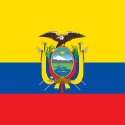Lenín Moreno
Lenín Boltaire Moreno Garcés (Spanish pronunciation: [leˈnim bolˈtajɾe moˈɾeno ɣaɾˈses]; born 19 March 1953) is an Ecuadorian politician who is the current President of Ecuador, in office since May 2017. Moreno was Vice President from 2007 to 2013, serving under President Rafael Correa.
Lenín Moreno | |
|---|---|
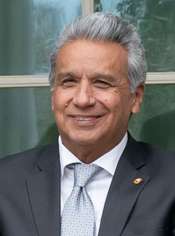 Lenín Moreno in 2020 | |
| 46th President of Ecuador | |
| Assumed office 24 May 2017 | |
| Vice President | Jorge Glas María Vicuña Otto Sonnenholzner Maria Alejandra Muñoz |
| Preceded by | Rafael Correa |
| 47th Vice President of Ecuador | |
| In office 15 January 2007 – 24 May 2013 | |
| President | Rafael Correa |
| Preceded by | Alejandro Serrano |
| Succeeded by | Jorge Glas |
| United Nations Special Envoy on Disability and Accessibility | |
| In office 19 December 2013 – 30 September 2016 | |
| Secretary General | Ban Ki-moon |
| Preceded by | Position established |
| Succeeded by | Maria Soledad Cisternas Reyes |
| President of the PAIS Alliance | |
| Assumed office 1 May 2017 | |
| Preceded by | Rafael Correa |
| Personal details | |
| Born | Lenín Boltaire Moreno Garcés 19 March 1953 Nuevo Rocafuerte, Ecuador |
| Political party | PAIS Alliance |
| Spouse(s) | |
| Children | 3 |
| Residence | Carondelet Palace |
| Alma mater | Central University of Ecuador |
| Signature |  |
He was nominated as the candidate for Correa's PAIS Alliance, a centre-left, democratic socialist[1] political party, in the 2017 presidential election and won a narrow victory in Ecuador's second round of voting on 2 April 2017.[2] However, after his election Moreno drastically shifted his political stance, distancing himself from Correa's leftist legacy and making neoliberal changes to both domestic and foreign policy.[3][4]
Moreno was shot in 1998 in a robbery attempt and thereafter has used a wheelchair. For his advocacy for people with disabilities, he was nominated for the 2012 Nobel Peace Prize.[5] According to the New York Times, when he assumed office on 24 May 2017, Moreno became the world's only currently serving head of state to use a wheelchair.[6]
Background
Childhood
Lenín Moreno was born into a middle-class family in Nuevo Rocafuerte, a small town in the Ecuadorian Amazon, near the Peruvian border. His father, Servio Tulio Moreno, was a teacher who promoted bilingual education and integrated schools for indigenous children and mestizo children and who later became a senator. His parents named him after their favorite authors; his father idolized Vladimir Lenin and his mother liked Voltaire, although an error in the civil registration turned his middle name into Boltaire[7][8] (in Spanish the letters v and b correspond to the same phoneme).[9] He moved to Quito with his family when he was three years old.[10]
Education
Moreno studied in Quito at the Instituto Nacional Mejía (Mejia National Institute), the Colegio Nacional Sebastián Benalcázar (Sebastian Benalcazar National School), and the Universidad Central del Ecuador (Central University of Ecuador), where he earned a degree in Public Administration and was honored as the best graduate. He studied psychology.[11]
Career
Moreno began his career in 1976 as the director of the Continental Professional Training Center. He went on to become Director of OMC Publigerencia Andina, sales manager of Satho and marketing manager of Zitro, all located in Ecuador. Then he moved to the public sector, taking an administrative post with the Minister of Government. He worked extensively in the public tourism industry. He founded the Chamber of Tourism of Pichincha, a province in Ecuador, and was Executive Director of the National Federation of Tourism Chambers and Executive Director of the Chamber of Tourism of Pichincha, between 1997 and 1999.
Politics and awards
Moreno has earned numerous awards while serving as vice president of Ecuador: the "Fray Jodoco Ricke" Award; the Order of the Sun of Peru in the rank of Grand Cross; and the Order of Merit to the Democracy, presented by the governments of Peru, Guatemala and Colombia, respectively. He was also recognized unanimously by the Council of the Metropolitan District of Quito with the order of Gran Collar Sebastian Benalcazar. He has received various Honoris Causa awards, from the University of the Americas (Ecuador), Universidad Tecnica del Norte del Ecuador (Technical University of Northern Ecuador) and the Universidad San Martin de Colombia (San Martin University of Colombia). He earned a Honoris Causa Masters, from the Business School (ESAE), Spain, on 25 November 2011.
Moreno was appointed as Special Envoy on Disability and Accessibility by United Nations Secretary-General Ban Ki-moon in December 2013.[12]
Eventa Foundation
After being shot, Moreno created the "Eventa" foundation to promote humor and joy as a way of life-based on his personal experiences.
He is the author of numerous books on his theory of humor, including: Filosofía para la Vida y el Trabajo ("Philosophy for life and work"), Teoría y Práctica del Humor ("Theory and Practice of Comedy"), Ser Feliz es Fácil y Divertido ("Being Happy is Easy and Fun"), Los Mejores Chistes del Mundo ("World's Best Jokes"), Humor de los Famosos ("Humor of the Famous"), Trompabulario, Ríase, no sea enfermo ("Laugh, don’t be sick") and Cuentos no Ecológicos ("Non-Ecological Tales").[13]
Vice Presidency
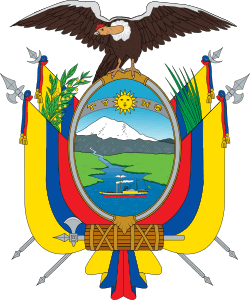 |
|---|
| This article is part of a series on the politics and government of Ecuador |
|
|
Legislative
|
|
Judiciary
|
|
|
|
|
During his first year in the office of Vice President, Moreno investigated the state of disabled people in Ecuador. At the time the government's entire budget for disabled services was approximately US$100,000. Moreno increased the budget for disabled people more than fifty-fold. The state currently assists over 600,000 disabled Ecuadorians, and provides housing and income for 15,000 people and prostheses for another 4,000.[8]
Through his 'Ecuador without Borders' programme, rights for disabled people were introduced in laws passed in 2007 and 2012, and in the 2008 constitution, that empowered Ecuador's disabled; measures included in 2010 requiring companies with over 25 employees to have at least 4% of their staff people with disabilities.[14]
He also founded the Manuela Espejo Solidarity Mission for the Disabled, which offers rehab, technical help, and psychological support to thousands of disabled Ecuadorians. Between 2009 and 2010 the Solidarity Mission sent Ecuadorean and Cuban doctors[14] to over 1.2 million homes around the country and interviewed nearly 300,000 disabled people to find out what needs were most pressing. Many of those people received free medical checkups. And now the Solidarity Mission is spreading to Paraguay, Peru, Guatemala, Chile, El Salvador and Colombia.[15]
Moreno left the vice presidency on 24 May 2013 and was succeeded by Jorge Glas.[16] He was the first vice president to complete his term since 1992.
Nobel nomination
Moreno was nominated for the 2012 Nobel Peace Prize by Celso Maldonado, Vice President of the People with Disabilities Commission of the Ecuadorian National Assembly.[17]
Presidency of Ecuador
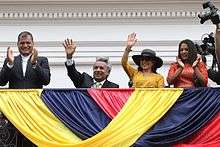
On 1 October 2016, Moreno was nominated as a candidate for the 2017 presidential election at the conference of Alianza País. The statement of his candidacy was made by President Rafael Correa.
In 19 February 2017 election, Moreno won the elections with 39.3% of the vote. However he was short by less than one percentage point of outright victory, as Ecuador requires in its two-round system.[18] In 2 April 2017 runoff, he defeated Guillermo Lasso, with 51.16% of the vote.[19][20]
Presidency
Within months of winning the election, Moreno started moving away from his election platform,[21] thus igniting a feud with ex-president Rafael Correa. Later in 2019, through a referendum,[22] Moreno reversed several key pieces of legislation passed by the Correa administration that targeted wealthy individuals and banks. He also reversed a previous referendum allowing indefinite re-election, and established the Consejo de Participación Ciudadana y Control Social Transitorio (CPCCS-T), which has supra-constitutional powers,[23] to "evaluate control authorities and judges", with the aim of removing what remains of Correa's influence.
Since the creation of CPCCS-T, Moreno has used it to oust and replace government officials, provincial judges, the judicial council, and the National Electoral Council (CNE).[24][25][26][27][28]
Lenin Moreno's government adopted a conservative policy: reduction of public spending, trade liberalization, and flexibility of the labour code. The Productive Development Act enshrines an austerity policy, and reduces the development and redistribution policies of the previous mandate. In the area of taxes, the authorities aim to "encourage the return of investors" by granting amnesty to fraudsters and proposing measures to reduce tax rates for large companies. In addition, the government waives the right to tax increases in raw material prices and foreign exchange repatriations.[29]
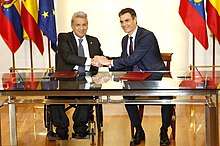
Moreno's government supported plans for oil drilling in Ecuador's Amazon region.[30]
With regard to public expenditure, the State can no longer increase public expenditure by more than 3% per year and restricts budget deficits to the repayment of interest on debt. Investments are thus significantly reduced, while privatizations are facilitated through subsidies guaranteed over several years. The government adopts the international system of dispute arbitration for all foreign investments, which is in violation of the Constitution. The first article of the Organic Law on the Defence of Labour Rights is deleted: it allowed the authorities to prosecute owners of companies that have harmed the interests of their employees by concealing resources or emptying the workshops of their machines.
Lenin Moreno announced in February 2019 that he had obtained a loan of more than $10 billion from the International Monetary Fund (IMF) and the World Bank, with which the previous government had broken off, "at rates below 5% on average and for terms of up to 30 years".[31]
In June 2019, Moreno's government faced protests from environmentalist, indigenous and self-described patriotic groups after he permitted the US military to use the airbase on Galápagos Islands.[32][33]
He faced yet more protests in September 2019, as pro-choice demonstrators protested the fact that Ecuador had failed to pass proposed legislation, which would have relaxed the nation's strict abortion laws to allow for abortion in the case of rape.[34]
On 2 October 2019, President Lenín Moreno declared the abolishment of fuel subsidies, which in turn triggered the start 2019 Ecuadorian protests. The government was forced to move from Quito to Guayaquil after effectively losing control of the capital to demonstrators.[35] Seven people were killed and 2,100 were arrested before Moreno signed directive 883, restoring the subsidies, which ended the protests on 13 October.[36]
Allegations of corruption
In March 2019, the INA papers scandal sparked a congressional corruption probe into Moreno.[37][38]
Mueller investigation
US Special Counsel Robert Mueller's team had been investigating a meeting between former Donald Trump campaign chairman Paul Manafort and President Moreno in Quito in 2017. Moreno talked with Manafort about removing WikiLeaks founder Julian Assange from the Ecuadorian Embassy in London and his extradition to the United States.[39]
Foreign policies
.jpg)
Following a June 2018 visit by U.S. Vice President Mike Pence, who agreed with President Moreno to improve the US-Ecuador relations which were strained under the presidency of Rafael Correa, Ecuador launched a security effort with the United States, including buying weapons, radar sets, six helicopters and other equipment, as well as cooperation with the U.S. that would include training and intelligence sharing.[40] Pence and Moreno also spoke about Julian Assange.[37]
In August 2018, Ecuador withdrew from ALBA, a regional bloc led by Venezuela and Cuba, in a bid to further distance itself from that country's socialist state and to be more “independent” of organizations that are trying to impose “specific views” on Latin America's social and political issues.[41]
In January 2019, Moreno supported Venezuelan opposition leader Juan Guaidó's claim to the Presidency of Venezuela, thus moving Ecuador away from its previous support of Nicolás Maduro.[42]
In early-2019 the IMF approved a $4.2bn loan for Ecuador.[43] In April 2019 the World Bank approved the Social Safety Net Project for Ecuador.[44]
After imposing new restrictions on Julian Assange, who had been given political asylum in Ecuador's London embassy since 2012,[45][46][47] on 11 April 2019, Ecuador revoked his asylum, with Moreno saying Ecuador had "reached its limit on the behaviour of Mr Assange", allowing the Metropolitan Police to arrest him in the embassy.[48]
By mid-2019, he moved Ecuador's diplomatic position closer to the United States as he allowed the US to use an airbase on the Galápagos Islands.[32]
Approval rating
Moreno enjoyed a popularity rating as high as 77% shortly after his election in 2017. His approval dropped slightly to around 69% by the start of 2018, before dropping to 45% by mid-2018 and further fell to under 30% by mid-2019.[49][50][51] After the 2019 Ecuadorian protests, Moreno reached an all-time low popularity, reaching only 7% of approval as of February 2020.[52]
References
- Ortiz-T., Pablo (2008), "Ecuador", The Indigenous World 2008, International Work Group for Indigenous Affairs, p. 147
- "Ecuador's ruling-party candidate Moreno declared presidential winner". ABC News.
- Gallegos, Franklin Ramírez (1 December 2018). "Ecuador veers to neoliberalism". Le Monde diplomatique.
- "Moreno's Neoliberal Restoration Proceeds in Ecuador". CounterPunch.org. 13 November 2018.
- "Secretary-General Appoints Lenín Voltaire Moreno Garces of Ecuador Special Envoy on Disability and Accessibility" (Press release). United Nations. 19 December 2013. Retrieved 20 February 2017.
- Londoño, Ernesto (7 April 2017). "Ecuador Elects World's Only Head of State in a Wheelchair". New York Times. Retrieved 28 April 2017.
- "Elecciones en Ecuador: quién es Lenín Moreno, el rostro conciliador que sucederá a Rafael Correa". Clarín (in Spanish). 3 April 2017. Retrieved 1 February 2018.
Nació allí porque sus padres -profesores- decidieron trabajar en Nuevo Rocafuerte, que aún hoy no tiene conexión por carretera. Un error en la inscripción en el Registro Civil hizo que su segundo nombre fuera Boltaire, en vez de Voltaire. "Papá era de ideas socialistas y mamá de ideas liberales. A ellos les gustaba mucho leer; a papá, Lenín; y a mamá, Voltaire", explicó.
- Watts, Jonathan (19 February 2013). "Ecuador's Lenín Moreno gives revolutionary turn by quitting while on top". The Guardian. ISSN 0261-3077. Retrieved 20 February 2017.
- http://lema.rae.es/dpd/srv/search?id=d45ahCOicD6TkHkns8
- "Lenín Moreno, el heredero de la Revolución Ciudadana". LATERCERA. 3 April 2017.
- "Biografía".
- "Secretary-General Appoints Lenín Voltaire Moreno Garces of Ecuador Special Envoy on Disability and Accessibility". Press release. United Nations. 19 December 2013.
- Caselli, Irene (20 August 2013). "The law that empowered Ecuador's disabled". Quito: BBC News. Retrieved 31 January 2019.
- "Despite limited funds vice president leads the charge to make Ecuador accessible to the handicapped". CuencaHighLife. 16 March 2011. Archived from the original on 30 October 2014. Retrieved 2 June 2017.
- "Vicepresidentes en la historia" (PDF). www.vicepresidencia.gob.ec. Retrieved 25 November 2017.
- "Vicepresidente Lenin Moreno mocionado para el Nobel de la Paz". La Republica. 3 February 2012.
- In the Ecuadorian system, to avoid a runoff a candidate needs either to win 50 percent of the first-round vote or to take 40 percent of the vote and be at least 10 percent ahead of the runner-up. (Guillermo Lasso had obtained 28.09%, so had Moreno gained 40 percent, then he would have won by the 40-10 rule.)
- "El Futuro Es Ahora".
- "CNE informa "resultados irreversibles": Moreno 51.16% – Lasso 48.84%" (in Spanish). Ecuavisa. 4 April 2017. Retrieved 28 April 2017.
- "¿Una broma? Presidente Moreno: A los que les estoy agarrando un poco de odio, más bien, es a los que votaron por mí (VIDEO)". Ecuadorinmediato.com. 30 August 2017. Retrieved 24 December 2018.
- "¿Cuáles son las siete preguntas del referéndum y la consulta popular del 4 de febrero del 2018 en Ecuador?". El Comercio (in Spanish). Retrieved 1 August 2018.
- FORAJIDO TV (8 May 2018), CESAR TRUJILLO DICE QUE EL CPCCS SI ESTA POR ENCIMA DE LA CONSTITUCION!, retrieved 1 August 2018
- "CPC Transitorio resuelve cesar en funciones a Gustavo Jalkh y a miembros del Consejo de la Judicatura". El Universo (in Spanish). 4 June 2018. Retrieved 1 August 2018.
- Telégrafo, El (5 April 2018). "Consejo suspende concursos de la Judicatura y cesa a Patricio Rivera". El Telégrafo (in Spanish). Retrieved 1 August 2018.
- quannt. "CPCCS-T CESÓ DE MANERA DEFINITIVA AL SUPERINTENDENTE DE BANCOS". www.cpccs.gob.ec (in Spanish). Retrieved 1 August 2018.
- quannt. "PLENO DEL CPCCS-T CESA EN FUNCIONES A SUPERINTENDENTA DE COMPAÑÍAS". www.cpccs.gob.ec (in Spanish). Retrieved 1 August 2018.
- "CPC transitorio resuelve destitución del superintendente Carlos Ochoa". El Universo (in Spanish). 7 March 2018. Retrieved 1 August 2018.
- "Équateur : Lenín Moreno et le néolibéralisme par surprise - Europe Solidaire Sans Frontières". www.europe-solidaire.org.
- "Indigenous peoples go to court to save the Amazon from oil company greed". Salon. 12 April 2019.
- "Ecuador recibirá préstamo de más de 10 mil millones de dólares de organismos internacionales". 24ecuador.
- Collyns, Dan (17 June 2019). "Galápagos Islands: outcry after Ecuador allows US military to use airstrip". The Guardian. ISSN 0261-3077. Retrieved 14 October 2019.
- "Ecuador: A Spasm of Unrest Threatens the Government". Stratfor. Retrieved 14 October 2019.
- Daniels, Joe Parkin (18 September 2019). "Clashes erupt after Ecuador fails to decriminalize abortion for rape victims". The Guardian. ISSN 0261-3077. Retrieved 14 October 2019.
- Dan Collyns (8 October 2019). "Ecuador moves government out of capital as violent protests rage". The Guardian. Retrieved 14 October 2019.
- Eoin Higgins (14 October 2019). "In Victory for People's Movement, Ecuador Protests End With Government Capitulation on Fuel Subsidies". Common Dreams. Retrieved 14 October 2019.
- "This simmering political clash may have led to Julian Assange's ouster from Ecuador's embassy". Business Insider. 11 April 2019.
- "Julian Assange to be kicked out of Ecuadorian embassy: WikiLeaks". Deutsche Welle. 5 April 2019.
- "Paul Manafort reportedly tried to make a deal with Ecuador to hand over Julian Assange". CNBC. 3 December 2018.
- Ecuador says it is launching security effort with US. Fox News. Retrieved 3 August 2018.
- Ecuador leaves Venezuelan-run regional alliance. 23 August 2018. The Seattle Times. Retrieved 24 August 2018.
- "OAS Member States Issue Joint Statement on Venezuela". U.S. Mission to the Organization of American States. 24 January 2019. Retrieved 14 October 2019.
- IMF approves $4.2bn loan for Ecuador. Tuesday 12 March 2019.
- The World Bank Approves a US$350 Million Loan to Strengthen the Social Safety Net in Ecuador. 4 April 2019.
- Henley, Jon (28 March 2018). "Ecuador cuts off Julian Assange's internet access at London embassy". Retrieved 24 December 2018 – via www.theguardian.com.
- "Julian Assange to regain internet access at embassy base – reports". 14 October 2018. Retrieved 10 January 2019.
- "Lenín Moreno: "Assange puede seguir gozando del asilo, mientras cumpla" - DW - 30.05.2018". DW.COM. Retrieved 24 December 2018.
- "Julian Assange: Wikileaks co-founder arrested in London". BBC News. 11 April 2019. Retrieved 13 April 2019.
- "Moreno's approval rating tumbles as popular concern grows over border violence – CuencaHighLife". cuencahighlife.com. Retrieved 14 October 2019.
- Press, Associated (5 February 2018). "Ecuador votes to limit presidents' terms in blow to Rafael Correa". The Guardian. ISSN 0261-3077. Retrieved 14 October 2019.
- "Lenín Moreno's new economic policy". The Economist. 11 April 2019. ISSN 0013-0613. Retrieved 14 October 2019.
- "Encuestadora: la popularidad de Lenín Moreno toca fondo". www.expreso.ec. Retrieved 12 February 2020.
External links
| Wikimedia Commons has media related to Lenín Moreno. |
- VicePresidencia del Ecuador
- Lenin Moreno NO gana el Premio Nobel a la Paz y tiene 98% de aprovación
- Sitio Web Oficial de Lenín Moreno
- Biography by CIDOB
- video: President Moreno's address to the 72nd session of the United Nations General Assembly, 20 September 2017 (English version) (UN Web TV)
| Political offices | ||
|---|---|---|
| Preceded by Alejandro Serrano |
Vice President of Ecuador 2007–2013 |
Succeeded by Jorge Glas |
| Preceded by Rafael Correa |
President of Ecuador 2017–present |
Incumbent |
| Party political offices | ||
| Preceded by New creation |
First Vice President of the PAIS Alliance 2006–2017 |
Succeeded by Jorge Glas |
| Preceded by Rafael Correa |
President of the PAIS Alliance 2017–present |
Incumbent |
| Diplomatic posts | ||
| Preceded by Position established |
United Nations Special Envoy on Disability and Accessibility 2013–2016 |
Succeeded by Maria Soledad Cisternas Reyes |
